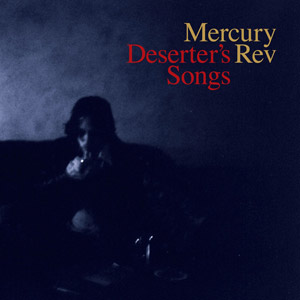
Deserter’s Songs
Co-Op
Had you asked me 10 years ago, I’d definitely have told you that Deserter’s Songs’ predecessor, Mercury Rev’s 1995 release See You on the Other Side, was the superior record, and interviews from the time indicate that bandleader Jonathan Donahue would have been inclined to agree with me. So it’s to my great surprise and pleasure that Deserter’s Songs turns out be remarkably timeless and engaging at this late date. I’m grateful to have it back in my ears after all this time, and with a disc’s worth of revealing oddities to boot. Even so, and even from a distance of 15 years, it’s extremely difficult to assess the place of Mercury Rev’s peak effort in the lineage of experimental pop music. It’s certainly not been heard by as many music fans as it should have been, and it’s probably been under-appreciated by those who did hear it, so I find it specious to call it “influential.” And it’s certainly gotten mixed up in, and over-shadowed by, the legacy of a very similar and universally revered masterpiece put out by a group of Donahue’s ex-cohorts known as the Flaming Lips.
One helpful way to think of Deserter’s Songs is as The Soft Bulletin in a dark mirror. Donahue’s membership as second guitarist with the Flaming Lips had been over for a few years, but Mercury Rev co-producer and bassist Dave Fridmann remained (and continues to remain) intimately engaged with the group. In fact, since Deserter’s Songs beat the Lips’ classic to market by only eight months, it’s not difficult to imagine Fridmann working on both albums simultaneously. That’s quite possibly a red herring worthy of conspiracy theorists, but the fact is that grandiose, yet tender, Deserter’s songs like “Endlessly” and “Goddess on a Hiway” would be right at home next to “A Spoonful Weighs a Ton.” In fact, what’s more difficult to accept is the incredible similarity between the paths taken by Donahue and Wayne Coyne after they parted ways six years earlier. They split up over artistic differences, right?
Putting that aside, the contrasts here are what really make this an album worth experiencing for its own unique mojo. Where the Lips went for grandiose optimism, Mercury Rev usually found heartache. Where Coyne’s band looked to futuristic sounds to fill out their psychedelic visions, Donahue’s crew turned to aging instruments; take, for example, the dense organ on “Pick Up If You’re There,” the creaky victrola of “I Collect Coins,” and the bowed saw that shows up on at least three tracks. Most importantly, though, there are some great songs here that will no doubt continue to age well. Album opener “Holes” is orchestral, otherworldly, and sad. “Hudson Line” has a light, groovy touch, and features Garth Hudson on saxophones. But the real standout is “Opus 40.” They play it rock-solid with confidence and a catchy melody, a bigger than life chorus, a whistling denouement, and Levon Helm sitting in on drums. Like most of the album, it really sounds like it could been recorded yesterday, 15 years ago, or even further back, and it’s reason enough to discover or rediscover this underrated classic.
Matt Slaybaugh
MP3: “Opus 40”
PAST PERFECTS
The Kinks, Kinks, Kinda Kinks and The Kink Kontroversy
The Zeros, "Main Street Brat" and The Normals, "Almost Ready"
Pearl Jam, Vs. and Vitalogy
Swearing at Motorists, Postcards from a Drinking Town
Talk Talk, Spirit of Eden
Disco Love 2: More Rare Disco & Soul Uncovered
Nick Lowe, Labour of Lust
Queens of the Stone Age, Queens of the Stone Age
Human Switchboard, Who’s in My Hangar?
Johnny Cash, From Memphis to Hollywood: Bootleg Vol. 2
Miles Davis, Bitches Brew Live
The Witches, A Haunted Person's Guide to...
Fela Kuti, "Power Show" Batch, Part II
Fela Kuti, "Power Show" Batch, Part I
